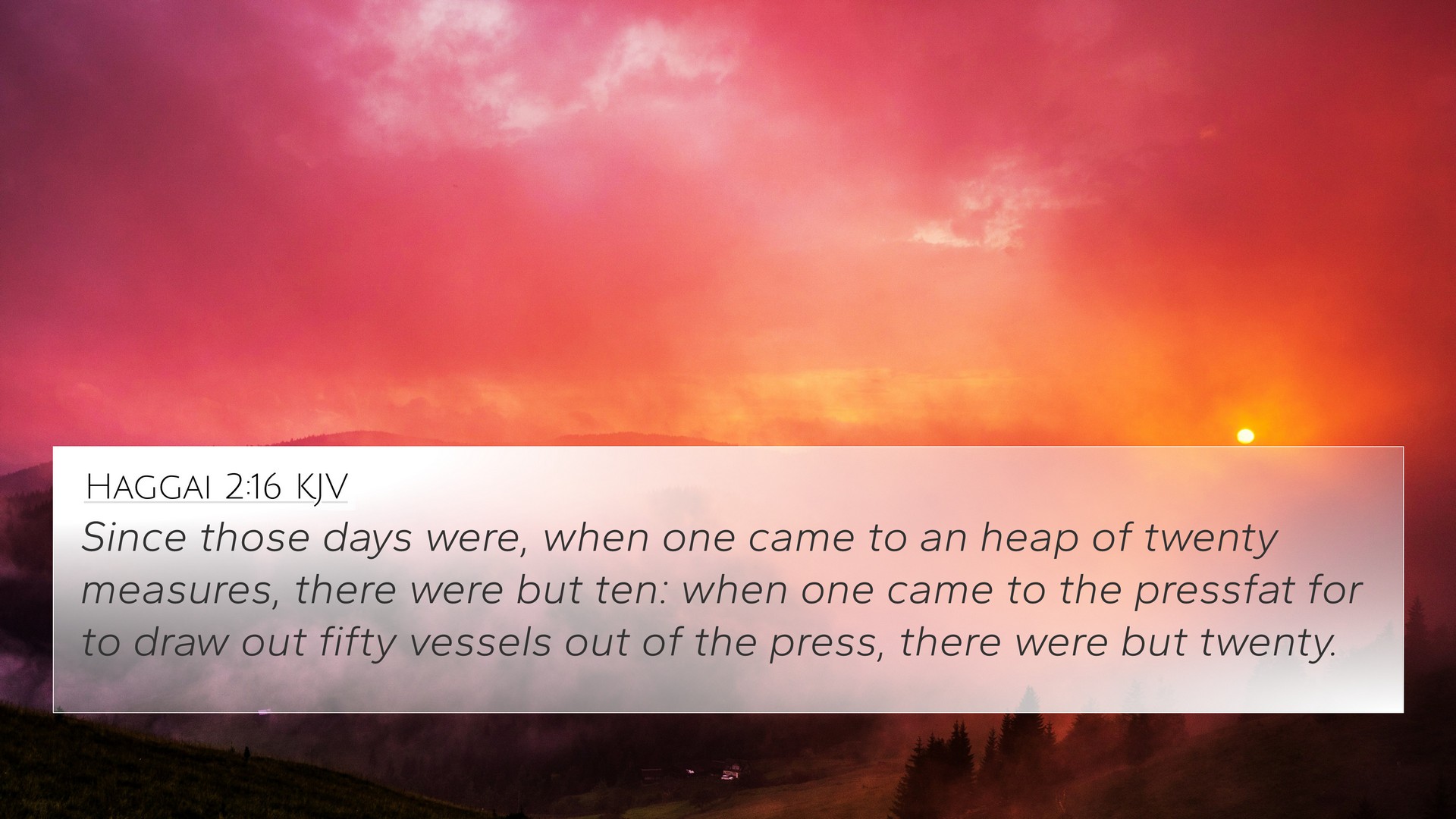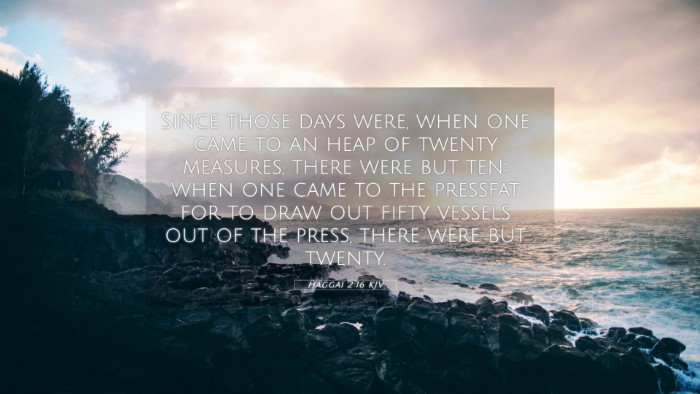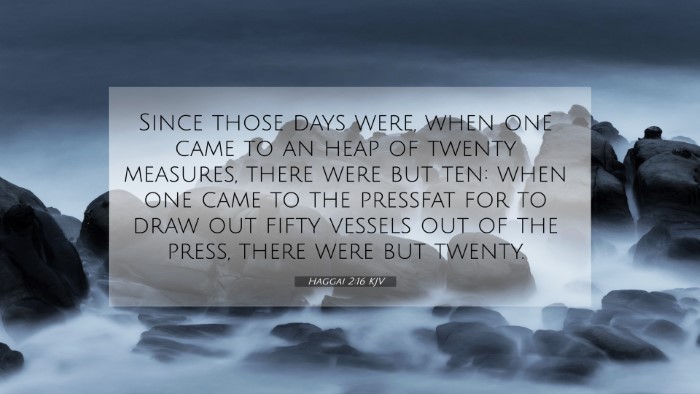Old Testament
Genesis Exodus Leviticus Numbers Deuteronomy Joshua Judges Ruth 1 Samuel 2 Samuel 1 Kings 2 Kings 1 Chronicles 2 Chronicles Ezra Nehemiah Esther Job Psalms Proverbs Ecclesiastes Song of Solomon Isaiah Jeremiah Lamentations Ezekiel Daniel Hosea Joel Amos Obadiah Jonah Micah Nahum Habakkuk Zephaniah Haggai Zechariah MalachiHaggai 2:16 Similar Verses
Haggai 2:16 Cross References
Since those days were, when one came to an heap of twenty measures, there were but ten: when one came to the pressfat for to draw out fifty vessels out of the press, there were but twenty.
Uncover the Rich Themes and Topics of This Bible Verse
Listed below are the Bible themes associated with Haggai 2:16. We invite you to explore each theme to gain deeper insights into the Scriptures.
Haggai 2:16 Cross Reference Verses
This section features a detailed cross-reference designed to enrich your understanding of the Scriptures. Below, you will find carefully selected verses that echo the themes and teachings related to Haggai 2:16 KJV. Click on any image to explore detailed analyses of related Bible verses and uncover deeper theological insights.
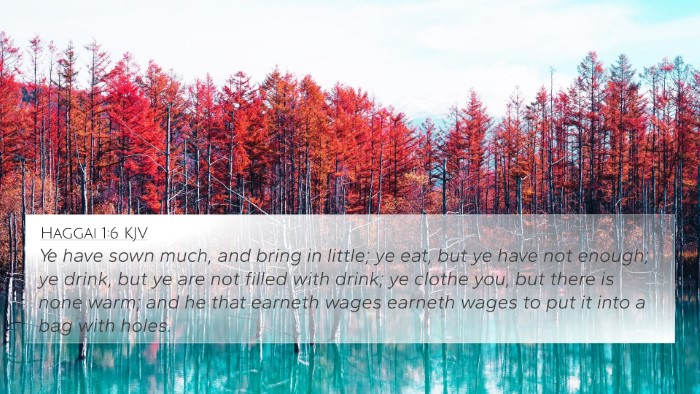
Haggai 1:6 (KJV) »
Ye have sown much, and bring in little; ye eat, but ye have not enough; ye drink, but ye are not filled with drink; ye clothe you, but there is none warm; and he that earneth wages earneth wages to put it into a bag with holes.
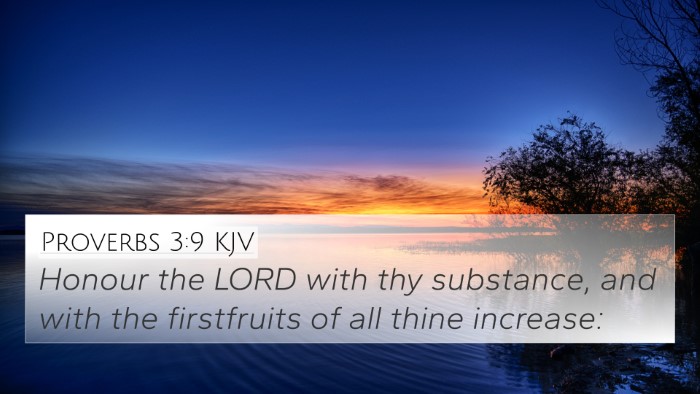
Proverbs 3:9 (KJV) »
Honour the LORD with thy substance, and with the firstfruits of all thine increase:
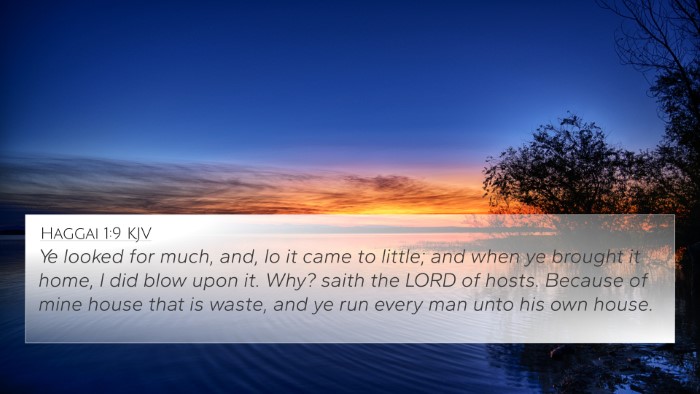
Haggai 1:9 (KJV) »
Ye looked for much, and, lo it came to little; and when ye brought it home, I did blow upon it. Why? saith the LORD of hosts. Because of mine house that is waste, and ye run every man unto his own house.

Zechariah 8:10 (KJV) »
For before these days there was no hire for man, nor any hire for beast; neither was there any peace to him that went out or came in because of the affliction: for I set all men every one against his neighbour.
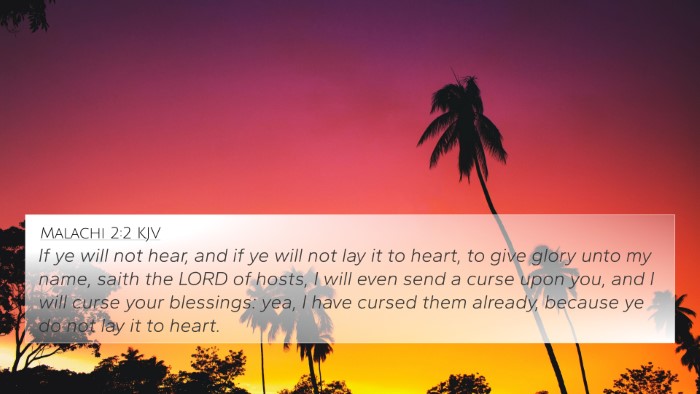
Malachi 2:2 (KJV) »
If ye will not hear, and if ye will not lay it to heart, to give glory unto my name, saith the LORD of hosts, I will even send a curse upon you, and I will curse your blessings: yea, I have cursed them already, because ye do not lay it to heart.
Haggai 2:16 Verse Analysis and Similar Verses
Understanding Haggai 2:16
Haggai 2:16 states: "Since those days were, when one came to a heap of twenty measures, there were but ten: when one came to the pressfat for to draw out fifty vessels out of the press, there were but twenty."
This verse reflects a period of famine and want among the people of Israel. The prophet Haggai, inspired by God, speaks to the desolation resulting from their neglect of temple work. Here is a summarized interpretation from various public domain commentaries, including insights from Matthew Henry, Albert Barnes, and Adam Clarke.
Summary of Commentary Insights
-
Matthew Henry:
Henry emphasizes the economic hardships faced by the Israelites during this period. He explains that the people had witnessed their efforts to gather grain and produce but found their work unfruitful. This, according to Henry, is a direct consequence of their disobedience to God and neglecting His house. The diminished yield serves as a symbolic reminder of God's divine judgment for their priorities.
-
Albert Barnes:
Barnes elaborates on the physical and spiritual decay of Israel. He discusses how the people, despite their efforts, fell short of what they expected. This indicates not only a lack of material blessing but also a spiritual void caused by their failure to honor God. According to Barnes, this verse illustrates God's displeasure due to the people's priorities being misplaced, which can manifest in various aspects of life.
-
Adam Clarke:
Clarke interprets the verse in light of the historical context, suggesting that the decrease in agricultural yield was a tangible sign of God's withdrawal of blessings. He connects this decline to the urgent need for spiritual renewal within the community. Clarke warns that neglecting spiritual duties leads to material failures, thus reinforcing the necessity of turning back to God and refocusing on their covenantal responsibilities.
Connections Between Bible Verses
This verse can be linked to several other biblical passages that resonate with its themes of spiritual neglect, divine judgment, and the resultant scarcity:
- Deuteronomy 28:38-40: This passage lists the curses for disobedience, including crop failure and loss.
- Malachi 3:8-10: God challenges His people about tithes and offerings, stating that their failure to honor Him leads to withheld blessings.
- Joel 1:10: Joel speaks of agricultural devastation as a call to repentance and a return to God.
- Isaiah 55:2: A call to seek the Lord and prioritize spiritual nourishment over earthly wants.
- John 15:5: Jesus teaches about abiding in Him for fruitful living, paralleling the neglect of Israel's spiritual life leading to empty harvests.
- Luke 12:16-21: The parable of the rich fool highlights the folly of prioritizing material wealth over spiritual well-being.
- 1 Corinthians 3:12-15: Paul discusses the foundation of faith and what builds upon it, indicating that divine approval is essential for true prosperity.
Tools for Bible Cross-Referencing
Understanding Haggai 2:16 in the broader context of scripture can be enhanced through various tools and methods for cross-referencing:
- Bible Concordance: A useful resource for finding specific verses and their meanings, as well as related themes.
- Bible Cross-Reference Guide: Offers a systematic approach to identify verses that relate to each other, creating a network of scriptural connections.
- Cross-Reference Bible Study: Engaging in studies that link verses can lead to a deeper understanding of biblical themes and God's character.
- How to Use Bible Cross-References: Practical methods for utilizing references in personal study or sermon preparation, helping to draw connections between passages.
- Bible Reference Resources: Utilizing various resources can aid in finding thematic connections and enhancing the study experience.
Comparative Bible Verse Analysis
A thorough examination of Bible verses that relate to Haggai 2:16 reveals both thematic and narrative connections. This verse highlights a cycle of spiritual neglect leading to material consequences, a motif found throughout the scriptures.
Inter-Biblical Dialogue
The dialogue between Haggai and other books of the Bible illustrates a profound message about maintaining the right priorities in life. By addressing both the physical and spiritual ramifications of disobedience, this verse serves as a timeless instruction for all believers.
Conclusion
Haggai 2:16 is a poignant reminder of the necessity of prioritizing our relationship with God. The insights drawn from historical context, combined with cross-references to similar themes in scripture, underscore the depth of understanding that can be achieved through dedicated study and reflection.
